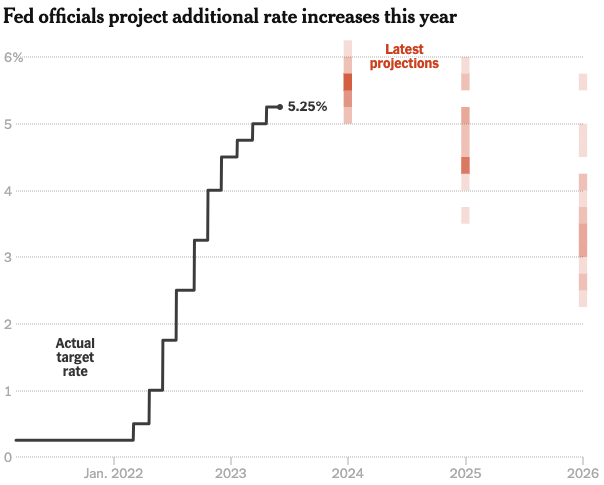The real estate market is a dynamic entity, constantly influenced by a myriad of factors. One such factor that has been making headlines recently is the Federal Reserve's decision to leave interest rates unchanged. This decision, as reported by the New York Times, comes after a series of 10 consecutive rate increases since March 2022.

But what does this mean for you, whether you're a homeowner, a prospective buyer, or an investor in the real estate market? Let's break it down.
For Homeowners
For homeowners, rising interest rates can have varied effects. If a homeowner has a fixed-rate mortgage, the immediate impact of rising rates is minimal. However, those with adjustable-rate mortgages may see their monthly payments increase. Additionally, rising interest rates might impact homeowners looking to tap into their home equity through a home equity line of credit (HELOC), as these often have variable rates. On the positive side, if rising rates lead to a cooling down of the housing market, it might become less competitive should homeowners decide to move. Furthermore, despite the increase, there might still be an opportunity to refinance at a relatively lower rate if homeowners locked in their original mortgage when rates were high. Carefully evaluating refinancing options can be essential in such scenarios. For those considering refinancing, homeowners can explore various refinance loan products and get valuable insights by visiting one of our great lending partners sites linked here. This resource can be particularly helpful in understanding the options available and making an informed decision.

For Prospective Buyers
For home buyers, rising interest rates can create both challenges and opportunities. As rates climb, mortgage payments become more expensive, which might limit the budget for prospective buyers and reduce the range of properties they can afford. This makes it even more critical for buyers to carefully evaluate their financial situation and to shop around for the best mortgage terms. On the upside, rising interest rates can sometimes cool down a hot housing market, leading to lower property prices and less competition among buyers. In such scenarios, patient buyers might find opportunities to purchase homes at more favorable prices. It’s also crucial for first-time buyers to be well-informed and prepared for the home-buying process, particularly in a changing interest rate environment. For invaluable insights and guidance, first-time home buyers should consider consulting The Ultimate Guide for First-Time Home Buyers, which can be a vital resource in navigating the complexities of the housing market.

For Sellers
Rising interest rates can have mixed implications for sellers in the real estate market. As the cost of borrowing increases, the pool of potential buyers who can afford to take on a mortgage shrinks. This may lead to a decrease in demand, which can put downward pressure on property prices. Sellers might find it takes longer to sell their properties, or they might have to reduce their asking prices to attract buyers. However, in the initial phase of rising rates, there might be a short-term surge in demand as buyers rush to lock in mortgages before rates climb higher. For sellers who are planning to reinvest in another property, they also need to consider that their own borrowing costs will be higher. Ultimately, the impact on sellers can vary depending on local market conditions and the broader economic context. For those selling in Allegheny County, consulting a detailed property selling guide can provide invaluable insights and strategies for navigating the market during times of rising interest rates.
For Investors
Rising interest rates can pose challenges for real estate investors. As rates climb, the cost of borrowing increases, making mortgages more expensive and potentially reducing the pool of buyers. This, in turn, can lead to a decrease in property values. Additionally, investors with variable-rate mortgages may face higher payments, affecting cash flow. While demand for rental properties might increase as home ownership becomes less affordable for some, there is no guarantee that this will translate into significantly higher rental income. Also, rising rates may make alternative investments like bonds more attractive, potentially diverting capital away from the real estate market. Savvy investors need to carefully assess their portfolios and strategies in light of rising interest rates and be prepared to adapt as necessary.

In conclusion, the Federal Reserve's recent decisions and the broader economic context are crucial to understanding the current state of the real estate market. Whether you're a homeowner, a prospective buyer, a seller, or an investor, these factors can have a significant impact on your real estate decisions. As always, we at Tim Sells Pittsburgh are here to guide you through these complexities and help you make informed decisions.

